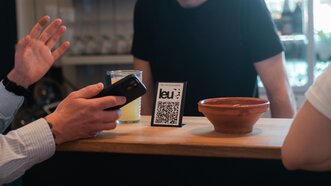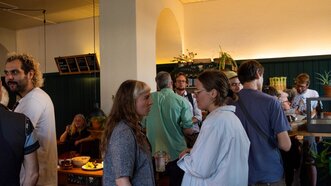My personal path into the field of digitalization and decentralization was initially characterized by a critical attitude. As a person with a background in political science, I have long been concerned with issues of participation, accessibility and equal opportunities. Despite my scepticism, I was delighted to discover that my personal areas of interest are highly relevant in the context of digitalization. I was fascinated by the fact that discussions about participation and community building were taking place in the field of decentralized technologies. But what does community building actually mean?
Blog
Community building - what does that actually mean?
There are many new technological approaches that aim to simplify our lives and solve structural problems. But who designs them and, above all, who uses them in the end?
"In this sense, it is about a redistribution of participation from a homogeneous and specifically interested cohort to a diverse, resilient community."
For me, community building means involving people in projects who may not be the most obvious target group and giving them power to act. It also means that building communities is something we do together. In this sense, it is about a redistribution of participation from a homogenous and specifically interested cohort to a diverse, resilient community. Perhaps an example from a project will help to illustrate what I mean by this:
With the digital local currency Leu, we take the approach of providing people in Zurich with an additional income every 10 days, thereby strengthening the local economy. However, the fact that people have access to Leu is only possible because the technology behind it is based on blockchain. "Blockchain" is a word that triggers various reactions - including mine: a project with a blockchain background sounded strange at first. Foreign because it is an area with its own language and rules, characterized by a technical environment. However, I didn't want to continue criticizing and, above all, ignoring an area without getting to know it better.

I then realized that in the context of decentralization, I was able to develop a point of view that was strongly influenced by my academic background and my involvement with participation: Giving more people who don't come from the tech world the opportunity to use decentralized solutions. Or in other words: to do translation work. So that people do not feel rejected because of a language that involves the use of complicated technical terms, visual factors such as color, arrangement or the lack of use of accessible fonts. They also don't let socialized characteristics stop them from attending events and don't think they have to be experts to participate at all. Because additional income, like Leu, should be used by everyone, but that doesn't happen without active diversification work.
For me, community building means involving people who may not already be involved in the topic area. But this also means that, for me, community building in a project starts much earlier than in direct discussions with potential community members. It requires interdisciplinary approaches in the project and the challenge of explaining the project in simple language so that it is and remains understandable for as many people as possible. Because communities don't just happen. It takes an active effort to establish accessibility and interpersonal relationships.
